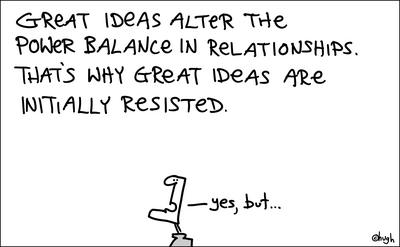Your Software Process Sucks : Resistance To Change
Filed Under Human Factors, Software ProcessIf you know the enemy and know yourself, you need not fear the result of a hundred battles. If you know yourself but not the enemy, for every victory gained you will also suffer a defeat. If you know neither the enemy nor yourself, you will succumb in every battle. – Sun Tzu, The Art of War
So you want implement change into your organization but you are faced with opposition. A penny pinching boss, a cocky know-it-all kid, or the grumpy old man are all personae in the work place that can foil a great productivity boosting plan. With the drums of war now thumping, the first step in the fight is to understand the reasons why it is human nature to resist change.
Power Struggle
Little needs to be said after seeing this Gaping Void cartoon
Power struggles between you and a senior position is the most common type of resistance to change. However, there is a second type of power struggle scenario that can be acted out between multiple senior positions. As an example, I watched a software process quickly fail solely because two executives competitively attempted to alter the process plan.
People in senior positions often treat change as being a good thing — as long as it is for someone else. When faced with change themselves, they may do whatever it takes to scupper the change, for example by refusing to give needed access or other support. – Changing Minds
Complacency
This is the feeling of self-satisfaction with an existing situation, or in short the old saying “If it ain’t broke, don’t fix it”. It pains me to see this mentality in companies. What they do not realize is that if they are not continually improving they are not growing.
Even if the final destination looks bright, people start resisting if they feel the transitional period will be painful. If extra-ordinary amounts of work and/or discomfort are anticipated people will start to analyze their individual return on investment. The majority of the time colleagues will lose interest and quit in the middle of the transition (or never start).
Loss
A wise little man once told me:
Train yourself to let go of everything you fear to lose. – Master Yoda
Alright…so what…it was Yoda. It still is a wise Taoist view of loss and the fear it can create. There are many reasons for fear of loss:
- Sunken costs if the proposed changes fail
- Loss of the investment of the process being replaced if the changes succeed
- Emotional attachments (i.e. having the process you created replaced)
- Loss of status or quality of life
Skepticism
Unfortunately, the saying “Ignorance is bliss” is not applicable when attempting to push change. People who do not fully understand the problem or your proposed change are going to be skeptical. Some skepticism is caused by people being uneducated in your attempts, but other people might be skeptical of your intentions.
Change = Fear
When it all boils down, change creates fear:
- Fear of losing power
- Fear of losing face (or embarrassment)
- Fear of working harder
- Fear of discomfort
- Fear of losing an investment
- Fear the “the unknown”
- Fear the lack of competence to change
- Fear of hidden agendas
Some reasons for resistance may be selfish and political. Other reasons may be driven by emotion or lack of understanding. Learning the types of resistance in your environment is the first weapon in learning how to successfully deal with your colleagues and bosses.



